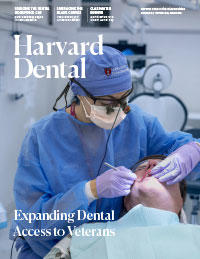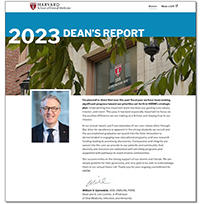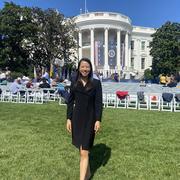
HSDM alumna Jacqueline Burgette, DMD08, holds the honor of being the very first dentist to be selected as a White House Fellow. The prestigious leadership program brings together individuals from across the country with backgrounds in local government, academia, the nonprofit sector, medicine, law, the private sector, and the armed forces, to work alongside public servants at the highest levels of the executive branch of the United States government. She describes her experience in the 2022-23 fellowship and what dentists can learn from public service.
Congratulations on the fellowship; could you describe what this honor means to you?
I am the first dentist to be a White House Fellow and hope not to be the last. I’ve learned a great deal about leadership and advocating for oral health by being outside the silo of our field. There is so much to learn about effective leadership and policy-making from other areas and taking a wider perspective. We can take guidance from federal policymakers who have effectively made an impact in many areas and apply them to oral health. I also find that I am a better storyteller when I can place oral health within the wider perspective of the needs and values of our country. All of this has made it more clear to me that it is important that not only experts in oral health but also experts in policy-making are at the table to shape the priorities for oral health in our Nation.
What led you to apply for the fellowship?
I have been lucky to have had an incredibly fulfilling career in academics. I believe I’ve made a lasting impact on my patients, students, mentees, colleagues, and community. I wanted to do this fellowship because health care and equity are priorities of the Biden-Harris administration and there is a window for change in health policy for this country. I wanted a front row seat to learn about federal policy-making and bring my skills and perspective to the table to serve at the highest levels of our government.
What has been your favorite or most interesting aspect of the fellowship thus far?
This has been an incredible year. I have changed as a person and professional in a fundamental way. There are experiences that foster moments of insight and self-reflection, which have bolstered my faith in myself and this country in a very moving way. The number one thing that I’m walking away with this year is that there are incredible leaders in the White House who have surpassed any image I previously held of a servant leader. The President values and demands tolerance, and when we treat each other well in our interpersonal relationships in the process of policy-making great things result.
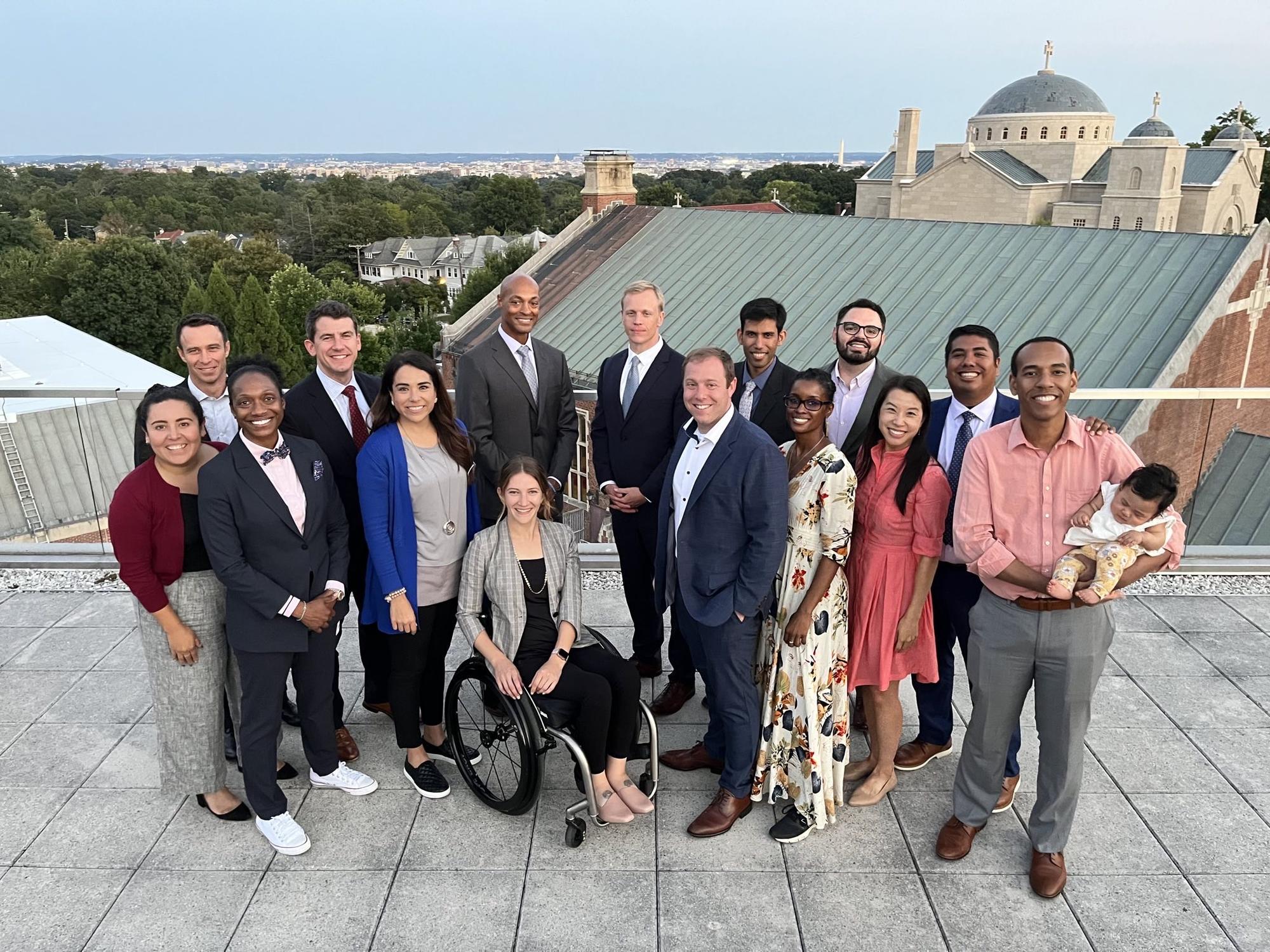
From your work with the Office of the National Cyber Director, what takeaways might you bring to your role in dentistry/academia/public health?
When I first started working in cybersecurity, I was struck by the magnitude and severity of the cyberattacks on our health care system. Our world is increasingly digital, and this trend has been accelerated by the COVID-19 pandemic. Prior to my time in the fellowship, I worked on improving access to teledentistry and telehealth, and to increase access to care in resource-poor communities. I also analyzed large data sets from electronic health records and Medicaid claims to improve health systems. With this new perspective in cybersecurity, I now see the potential for malignant actors to gain access to all of these digital resources. It’s not a question of if the health care system will be attacked, but when. We need to plan not only for when a clinic experiences a flood, but also a cyberattack.
The last thing I want is to have patients lose confidence that the privacy and security of their health visits and protected health information when they visit me in a clinic. The parts of society that we rely on every day, like hospitals and clinics, are vulnerable and need to be protected. This affects every part of our health system, not just dental health services. When a dental clinic experiences a cyber breach, they may not even know. Ultimately, if the attackers exploit patient data and ask for a ransom, this is an economic harm and may affect whether the dental clinic can stay in business and serve patients. Most importantly, the attackers may be foreign actors, and an attack on our health care critical infrastructure is an attack on our country. My hope is that all leaders in health care – including dental health – see the larger context that this can be an issue of national security.
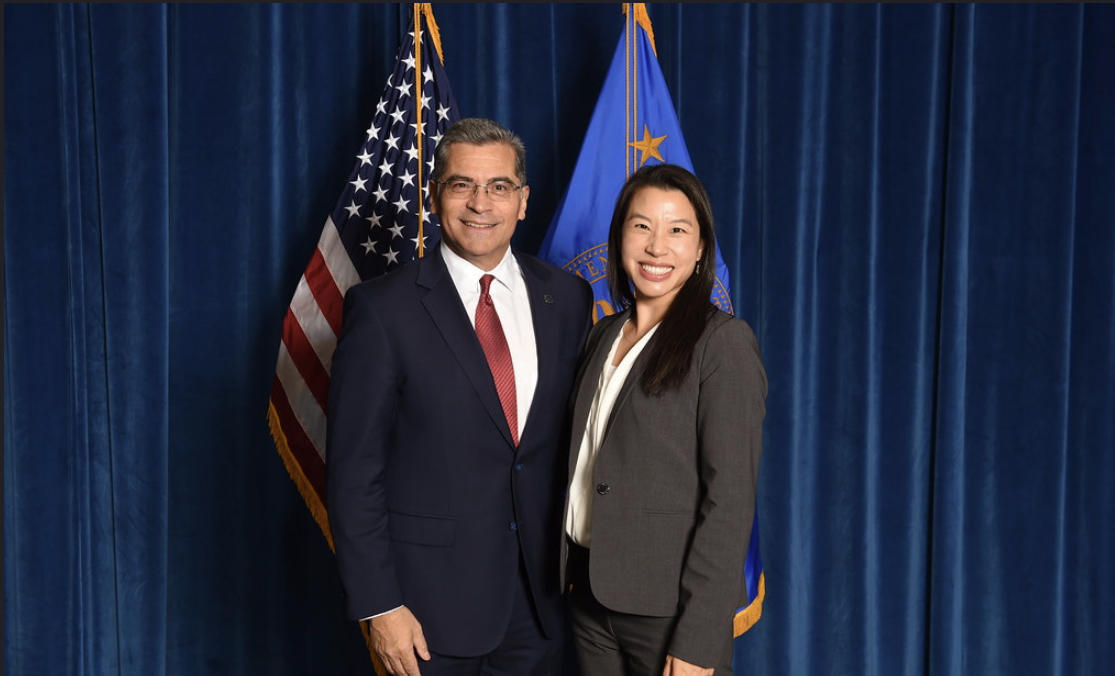
How did your dental education at HSDM shape your career and pursuits?
HSDM is a unique training environment that supports student leaders. During my dental training at HSDM, I had mentors, peers and alumni that taught me to have faith and trust in my ideas so that I could champion them with confidence. It was a great learning environment with support across the graduate schools to exchange ideas and support each other, especially in the unpolished early stages of a new endeavor. The Harvard system also taught me the importance of convening. When I was working in global health at HSDM, I realized that one of the unique strengths of Harvard is the ability to convene to inspire innovative ideas and build collaborations. This is where the magic happens! This lesson has been reinforced at during my time here at the White House. Convening with intentionality is essential to everyone move forward in a shared direction, get excited, and coordinate more effectively.
What advice do you have for predoctoral students who have an interest in taking a similar career path? Or getting involved in government/public policy?
The number one piece of advice that I have for trainees is to put away the false narrative that dentists can pursue one of two career paths: private practice or academia. When I work with mentees and trainees on life guidance, I enjoy doing an interactive thought exercise to surface the many opportunities to make an impact. I, too, have to constantly remind myself to think broadly and not be limited by what has been before. I would encourage all students - including the health science professions, public health and researchers - to let themselves think freely about who they are as a unique person and the contribution they’d like to make. I hope that we all direct our careers with intentionality based on our values and the impact that we’d like to make in the time we have. For federal government, this includes VA, DOD, EPA, and the many sectors of HHS including CDC, HRSA, CMS, FDA, and NIH. Within public service, federal government is just one level. State and local governments, too, make a huge impact

